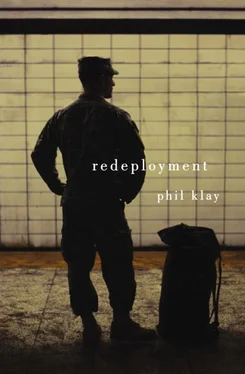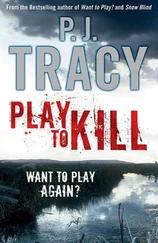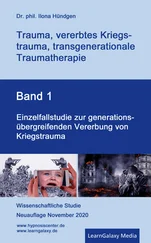“How’re things?” he said breathlessly.
“They’re breaking my heart,” I said. And then, because Bob didn’t care, and Cindy was outside the wire, and there was no one else to talk to, I told Major Zima what was happening. He already knew about Kazemi. It was old news at this point. But he hadn’t heard about the clinic’s funding. He stood and smiled at me, nodding encouragingly, a look of pure idiocy on his face. It was like confessing your sins to Daffy Duck.
“How,” I said at the end, “how do you deal with it? The bullshit?”
Major Zima shook his head sadly. “There is no bullshit.”
“No bullshit?” I said. “In Iraq?” I cracked the sort of cynical smile Bob was always shooting in Cindy’s direction.
Zima kept shaking his head. “There’s a reason for everything,” he said, sounding almost spiritual. “Maybe we can’t see it. But if you were here two years ago…” His face was blank.
“If I was here two years ago what?”
“It was madness,” he said. Zima wasn’t looking at me. He wasn’t looking at anything. “Things are getting better. What you’re dealing with, it isn’t madness.”
I looked away, and we stood there in silence until I couldn’t put off going to work any longer. I went to the ePRT office, he went back to jumping jacks. When I got to my computer, I sat and stared at it, unsettled. It felt as though Zima’s mask had slipped and given me a glimpse of some incomprehensible sadness, the sadness you saw all around you every time you left the FOB. This country had a history that didn’t reset when a new unit rotated in. This time, these problems, they were an improvement.
• • •
Two days later,Major Zima strolled into our office, whistling. He had a large green bag in one hand and a blank piece of paper in the other. He put the paper on my desk, pulled up a chair, and sat down.
He said, “I’m not really sure how you State boys write these things up, but here goes.”
Then he pulled out a pen with a flourish, hunched over the paper, and started writing, reading aloud what he put down.
“Our women’s business association,” he said, “has proved highly successful—”
“No, it hasn’t,” I said.
“Highly successful in sparking entrepreneurship among our AO’s disenfranchised population.”
Bob looked over, an eyebrow arched. Zima kept going, “In fact,” he said, scribbling illegibly with great speed, “due to its growing membership and the increasingly key place it has taken within community power structures, it has, on its own initiative, begun expanding its operations to encompass—” He looked up. “That’s a good word, right? Encompass ?”
“ Encompass is a great word,” I said, curious.
“To encompass a more holistic approach.”
“Have they now?” I said, smiling in spite of myself.
“Several promising businesses have failed, despite substantial opportunities for female employment, due to a lack of adequate child care and medical facilities. Providing these services is a prerequisite to a flourishing free market and represents a business opportunity in its own right.”
“Oh,” I said, getting it. “Very nice.”
Bob scowled.
“We are still collecting broader metrics, but two projects have been hamstrung by a lack of health care. One female bakery closed after two workers, both widows, stopped coming due to complications from untreated yeast infections.”
“There’s no way that’s true,” I said.
“Maybe someone gave me bad information,” the major conceded, “but I can’t be held responsible for that. We get bad information all the time.”
“I,” said Bob, standing up, “am going outside for a smoke break.”
“You don’t smoke,” I said. He ignored me.
“Statistics show,” Zima continued as Bob walked out, “that countries which improve health care do a better job improving their economies than countries which focus exclusively on business development.”
“Is that true?”
Major Zima put on his shocked face. “Of course it’s true,” he said. “I deal only in truth-hood.” After a moment he added, “I saw it in a TED Talk.”
“Okay,” I said. I looked down at the paper. “Can you get me the name of the speaker? Let’s see if we can do this.”
“Good,” said the major. “Glad we can work together on this. You know, I think I can even convince the colonel to throw in some CERP funds… .”
“That would be amazing,” I said.
“Oh,” he said, “and I was wondering. Could you help me with something?”
“What?” I said.
He pulled a blue baseball helmet out of the green bag and put it on my desk. “G. G. Goodwin wants a picture of kids playing baseball.”
• • •
The next two timesI went outside the wire, I went out with a baseball helmet, mitt, and bat. No uniforms in sight, though.
• • •
“I know what you’re doing,”said Chris Roper over the phone, “and this bullshit is not going to stand.”
“What?”
“You want to push the money for the clinic through the women’s association? You know ninety percent of it, if not more, is gonna go right into Abu Bakr’s pocket.”
“You wanted me to keep them going,” I said, “even knowing that. So why not have some of the money going to something real.”
“Uh-huh,” he said. “Very clever.”
“Something is better than nothing,” I said, “and funding for the clinic runs out next month.”
“Wow,” said Roper. “Honesty. How refreshing.”
“The clinic is big in the community,” I said. “It’s not a bad thing if the sheikh takes ownership of it.”
“It’s big for the women,” he said. “Have you met an Iraqi who gives a fuck about women?”
“There is a direct link,” I said, “between the oppression of women and extremism.”
“Don’t give me that bullshit,” he said.
“This is real,” I said. “And he’ll keep it going. It’ll hurt his reputation if he stops it.”
“Any buy-in from local councils?” he said.
“It says in the—”
“I know what it says,” he snapped. “Is there real buy-in?”
“Yes,” I said. “Minimal financial support. As long as we’re funding something, the Iraqis don’t want to step in and kill the goose that lays the golden eggs, but the bit in there about the distribution network—”
“Okay,” he said. “I’m gonna sit on this and think it over.”
It was more than I had any right to hope for.
• • •
The next week,while meeting with Sheikh Umer about the beekeeping project, I saw three children, two of them in uniforms. One gray, one blue. Perfect.
“Holy shit!” I said. “Professor, tell him I need to get a photograph with those children.”
Much explaining later, along with the understanding that I now owed a favor, I had one extremely confused child wearing a baseball helmet and another with a glove on his hand. I also had one highly irritated translator.
“I hate you more than I have ever hated you right now,” the Professor said, rubbing his glasses hard enough that I thought they might break.
“Why do you even work for us?” I said.
“Forty. Dollars. A day.”
“Nonsense,” I said. “You’re risking your life for us.”
He sized me up for a second. “There was hope at the beginning,” he said. His face softened a bit. “Even without hope, you must try.”
I smiled. Eventually, he smiled back.
After another bout of more or less patient explanations, we had the children lined up right, the one crouched like a pitcher and the other standing as if at bat. I saw a woman hurrying toward us out of the corner of my eye, but Sheikh Umer cut her off and began speaking to her in Arabic.
Читать дальше












